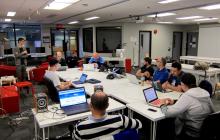Planet
By Mike Gifford
on 23/10/2015

Stephanie Daniels sums it up well, "Optimized sites are better for the environment. That’s because they’re significantly faster, more usable, with content that’s optimized for SEO and user experience. It’s my belief that Drupal has all of the tools in place to create sustainable websites…if you just know where to look.".
If only I had Drupal back in 1995. That was the year I built my first website for a Fair Trade Retailer called Bridgehead. Back at this time, the Internet was a very different place. People were using the web at that point, but it wasn't embedded in our lives like it is now...

Stephanie Daniels sums it up well, "Optimized sites are better for the environment. That’s because they’re significantly faster, more usable, with content that’s optimized for SEO and user experience. It’s my belief that Drupal has all of the tools in place to create sustainable websites…if you just know where to look.".
If only I had Drupal back in 1995. That was the year I built my first website for a Fair Trade Retailer called Bridgehead. Back at this time, the Internet was a very different place. People were using the web at that point, but it wasn't embedded in our lives like it is now...
By Liz Pringi
on 20/10/2015
Foreword:
Google Analytics is a great tool to see where people are browsing on your site, to monitor traffic, and possibly some other perks I'm unaware of. ;) So it's important to make sure it still works when you're upgrading the Google Analytics Tracking ID and updating the Google Analytics module, or just updating the module.
Why would you want to do that? Well: The 1.x branch of the Google Analytics module is now no longer supported, so if you want security updates you'll have to update to the 2.x branch (pretty straight-forward).
If you're reading this post, you're likely ...
Google Analytics is a great tool to see where people are browsing on your site, to monitor traffic, and possibly some other perks I'm unaware of. ;) So it's important to make sure it still works when you're upgrading the Google Analytics Tracking ID and updating the Google Analytics module, or just updating the module.
Why would you want to do that? Well: The 1.x branch of the Google Analytics module is now no longer supported, so if you want security updates you'll have to update to the 2.x branch (pretty straight-forward).
If you're reading this post, you're likely ...
By Mike Gifford
on 14/10/2015


Web accessibility is an important but often neglected piece of today’s web environment. Drupal 7 Core made a step in making the websites more accessible by default. Since it's release there have been improvements to Core's accessibility and also to the contributed modules to make the platform much more accessible.
Drupal 8 has added extensive support for accessibility in the Core. For anyone trying to make a barrier-free website, it is important to know what these features are and how each can be used.
Throughout this series we will look into the variety of...
Drupal 8 has added extensive support for accessibility in the Core. For anyone trying to make a barrier-free website, it is important to know what these features are and how each can be used.
Throughout this series we will look into the variety of...
By Matt Parker
on 03/08/2015
"Software testing" is a term used to refer to a variety of methods, tools, and practices for verifying that a software application works, at many different levels.
All of us in the web development industry do some sort of software testing (even if the testing we do is manual and ad hoc, e.g.: refreshing a webpage after making a change to ensure the code you just wrote works). In this blog post, I will attempt to discuss why you might want to move away from ad hoc testing to more-formal testing, try to dispel some myths about formal testing, and give a high-level overview of the different...
All of us in the web development industry do some sort of software testing (even if the testing we do is manual and ad hoc, e.g.: refreshing a webpage after making a change to ensure the code you just wrote works). In this blog post, I will attempt to discuss why you might want to move away from ad hoc testing to more-formal testing, try to dispel some myths about formal testing, and give a high-level overview of the different...
By Matt Parker
on 16/07/2015
This post is a follow-up to last week's post, Conforming to coding standards with linters.
As we learned last week, linters are tools that you can use to check if a file contains any syntax errors, and/or whether it conforms to coding standards. This blog post discusses how to ensure that linters get run automatically when you make a commit.
If you find a better process, please blog about it and post a link in the comments!
This tutorial assumes:
You write or modify code,
You have linters to run on your code, and,
You use Git to manage your code.
Git hooks
Git has a way to fire off...
As we learned last week, linters are tools that you can use to check if a file contains any syntax errors, and/or whether it conforms to coding standards. This blog post discusses how to ensure that linters get run automatically when you make a commit.
If you find a better process, please blog about it and post a link in the comments!
This tutorial assumes:
You write or modify code,
You have linters to run on your code, and,
You use Git to manage your code.
Git hooks
Git has a way to fire off...
By Matt Parker
on 15/07/2015


At the the DrupalNorth code sprint, I spent some time chatting about code linters, and how to use them to ensure your code conforms to coding standards. So, I thought I'd share the process that works for me.
If you find a better process, please blog about it and post a link in the comments!
This tutorial assumes:
You write or modify code in a language like PHP, JavaScript, CSS, Bash, etc.
What is a linter?
Simply put, a linter is a static analysis tool that you can run to ensure that your code is free from syntax and/or style errors.
Types of linters
To help me prioritize fixing...
If you find a better process, please blog about it and post a link in the comments!
This tutorial assumes:
You write or modify code in a language like PHP, JavaScript, CSS, Bash, etc.
What is a linter?
Simply put, a linter is a static analysis tool that you can run to ensure that your code is free from syntax and/or style errors.
Types of linters
To help me prioritize fixing...
By Mike Gifford
on 08/07/2015


I have been developing open-source software now for over a decade and feel that community software is a really important concept for inclusive technology. With the rise of the Linux operating system and more importantly with the growth of the Internet, more people and companies have embraced a collaborative culture. The growth of do-it-yourself initiatives that allow creators to use, modify and distribute ideas is key to making technology fit a wider range of humanity.
My company, OpenConcept, has been developing open-source solutions for the Web for the last 15 years. We develop with a...
My company, OpenConcept, has been developing open-source solutions for the Web for the last 15 years. We develop with a...
By Matt Parker
on 07/07/2015


The inaugral Drupal North Regional Summit was a blast!
The official Drupal North sprint was held on Sunday, June 28th, starting around 10am and ending at 4pm, in Ryerson University's Rogers Communication Centre Transmedia Zone. 21 attendees showed up from all over Canada, the United States, and even Costa Rica:
Adam White from Upper Rapids,
Alberto Rojas from Manatí,
Chris Luckhardt,
Claire Desbois from Floe design + technologies,
Eric Jenkins from Digital Bridge Solutions,
Jean-François Bohémier,
Jeremy Knab,
Jose Eduardo García Torres from Anexus IT,
Kevin Newman from Digital Echidna,...
The official Drupal North sprint was held on Sunday, June 28th, starting around 10am and ending at 4pm, in Ryerson University's Rogers Communication Centre Transmedia Zone. 21 attendees showed up from all over Canada, the United States, and even Costa Rica:
Adam White from Upper Rapids,
Alberto Rojas from Manatí,
Chris Luckhardt,
Claire Desbois from Floe design + technologies,
Eric Jenkins from Digital Bridge Solutions,
Jean-François Bohémier,
Jeremy Knab,
Jose Eduardo García Torres from Anexus IT,
Kevin Newman from Digital Echidna,...
By Matt Parker
on 27/05/2015
I've often been asked how I generate both patches and interdiffs at the same time, because the instructions on drupal.org currently detail the two processes separately, and different documentation pages give different instructions.
So, I thought I'd share the process that works for me, providing real-world examples from an issue that I've worked on.
If you find a better process, please blog about it and post a link in the comments!
This tutorial assumes that:
You know what patchfiles are,
You know how to use the command-line (the instructions should work in both *NIX and Windows), and,...
So, I thought I'd share the process that works for me, providing real-world examples from an issue that I've worked on.
If you find a better process, please blog about it and post a link in the comments!
This tutorial assumes that:
You know what patchfiles are,
You know how to use the command-line (the instructions should work in both *NIX and Windows), and,...
By Xavier Landreville
on 08/05/2015
Compared to languages such as Ruby or Python, PHP lacks a good REPL. REPL stands for read-eval-print loop, and no, php -a doesn't count. A good REPL will, for one, Print the result of each operation, which the standard CLI SAPI doesn't do (and it had trouble with the Eval part until recently). What the php -a client is, however, is an interactive scripting environement. You can type code, statements, as if you were within a php script, and they'll be evaluate the same way.
Enter boris. It is a quick, simple, tiny, powerful REPL for php, that will not die. The way boris works is to fork itself...
Enter boris. It is a quick, simple, tiny, powerful REPL for php, that will not die. The way boris works is to fork itself...
